An Analysis of Factors Contributing to Crime and Prevention
VerifiedAdded on 2022/10/04
|15
|1116
|21
Presentation
AI Summary
This presentation delves into the multifaceted factors contributing to criminal behavior. It explores biological factors such as genetic influences and brain abnormalities, along with the impact of environmental factors during early development. Social factors, including childhood neglect and exposure to violence, are also examined. The presentation further provides recommendations for crime prevention, including environmental and situational prevention strategies, penology, and the importance of proper childhood development and counseling for first-time offenders. The presentation highlights the complex interplay of these factors and suggests comprehensive approaches to reduce crime rates in society, drawing on various research studies and scholarly articles.
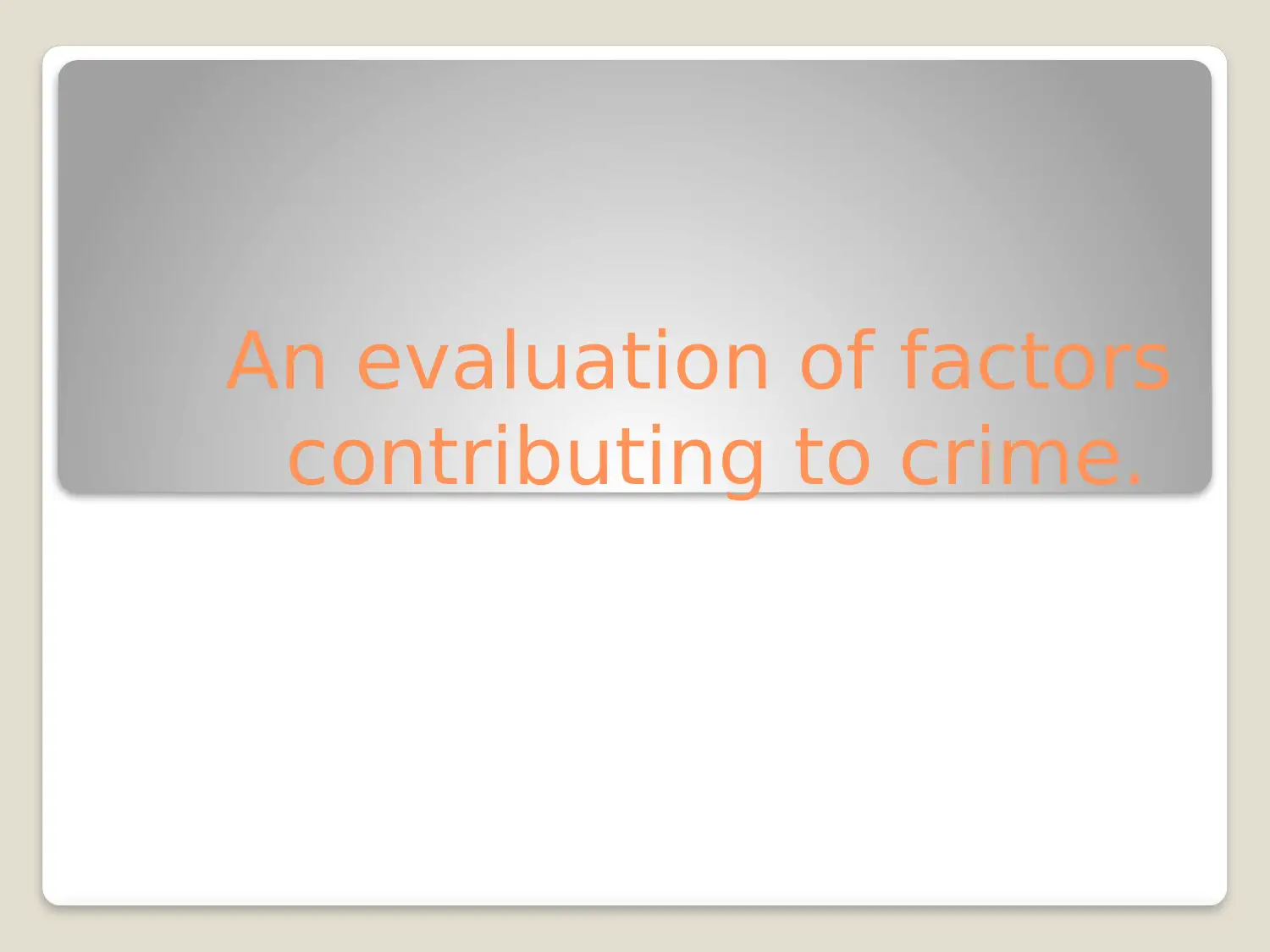
An evaluation of factors
contributing to crime.
contributing to crime.
Paraphrase This Document
Need a fresh take? Get an instant paraphrase of this document with our AI Paraphraser
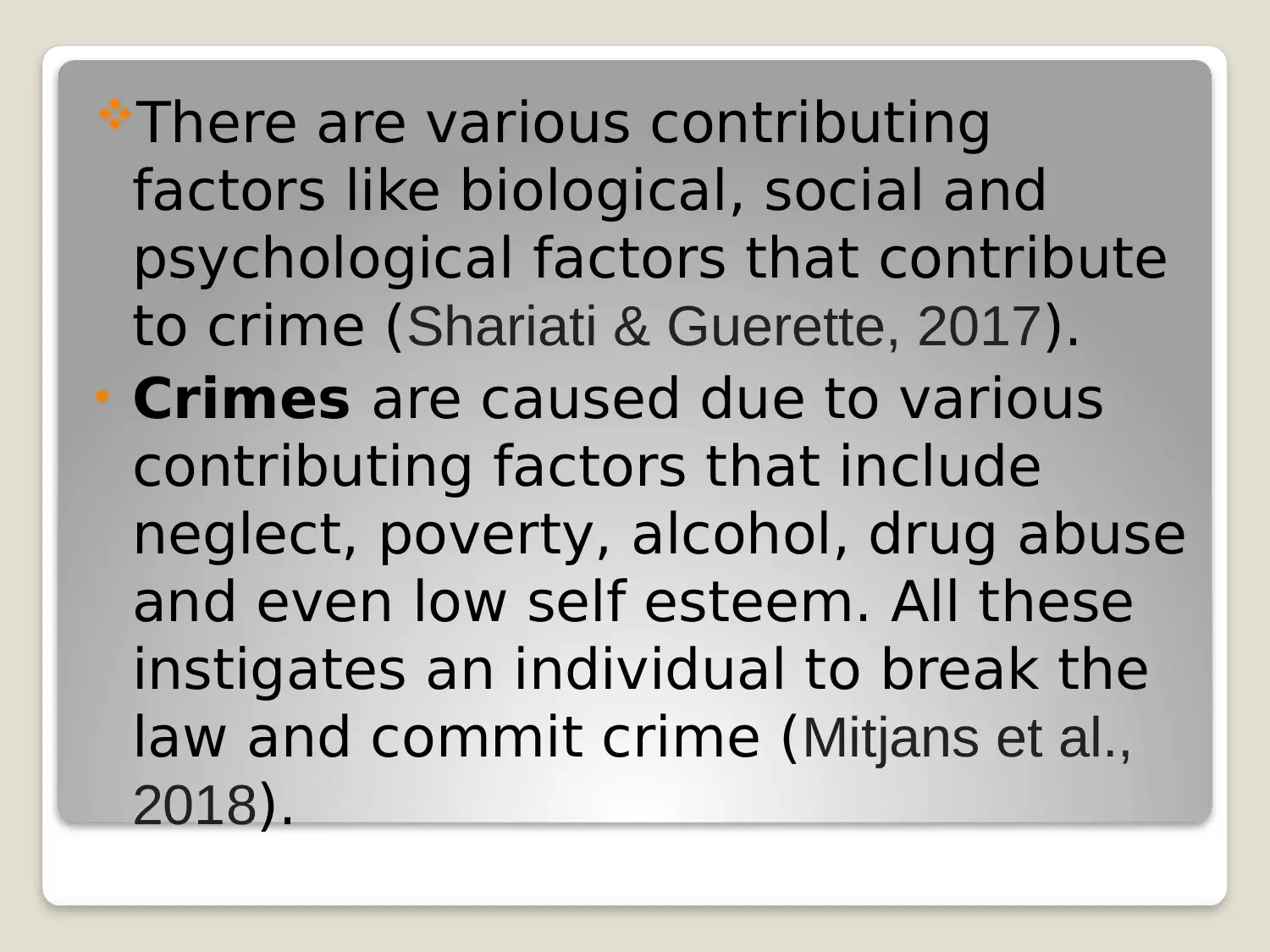
There are various contributing
factors like biological, social and
psychological factors that contribute
to crime (Shariati & Guerette, 2017).
• Crimes are caused due to various
contributing factors that include
neglect, poverty, alcohol, drug abuse
and even low self esteem. All these
instigates an individual to break the
law and commit crime (Mitjans et al.,
2018).
factors like biological, social and
psychological factors that contribute
to crime (Shariati & Guerette, 2017).
• Crimes are caused due to various
contributing factors that include
neglect, poverty, alcohol, drug abuse
and even low self esteem. All these
instigates an individual to break the
law and commit crime (Mitjans et al.,
2018).
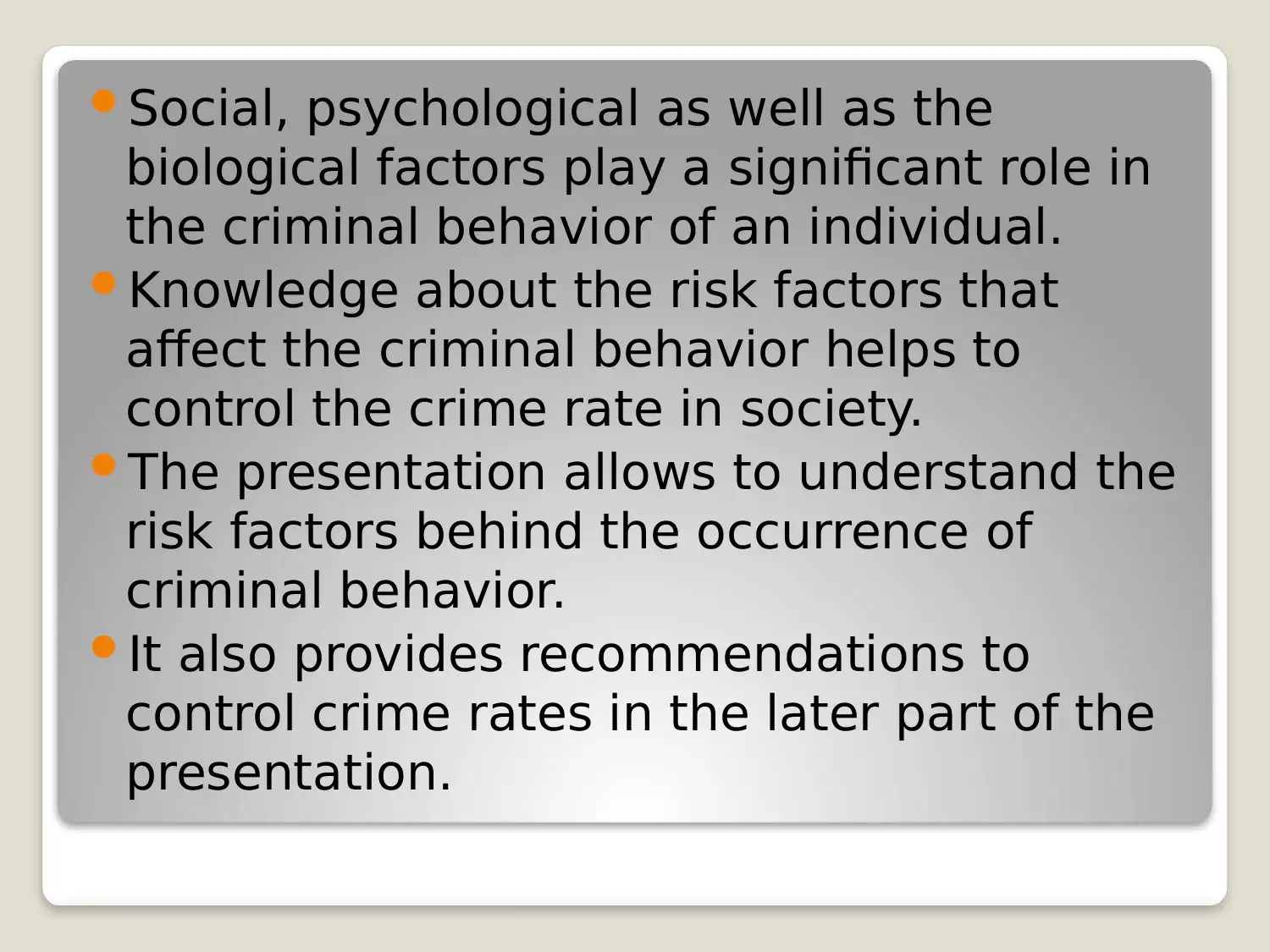
Social, psychological as well as the
biological factors play a significant role in
the criminal behavior of an individual.
Knowledge about the risk factors that
affect the criminal behavior helps to
control the crime rate in society.
The presentation allows to understand the
risk factors behind the occurrence of
criminal behavior.
It also provides recommendations to
control crime rates in the later part of the
presentation.
biological factors play a significant role in
the criminal behavior of an individual.
Knowledge about the risk factors that
affect the criminal behavior helps to
control the crime rate in society.
The presentation allows to understand the
risk factors behind the occurrence of
criminal behavior.
It also provides recommendations to
control crime rates in the later part of the
presentation.
⊘ This is a preview!⊘
Do you want full access?
Subscribe today to unlock all pages.

Trusted by 1+ million students worldwide
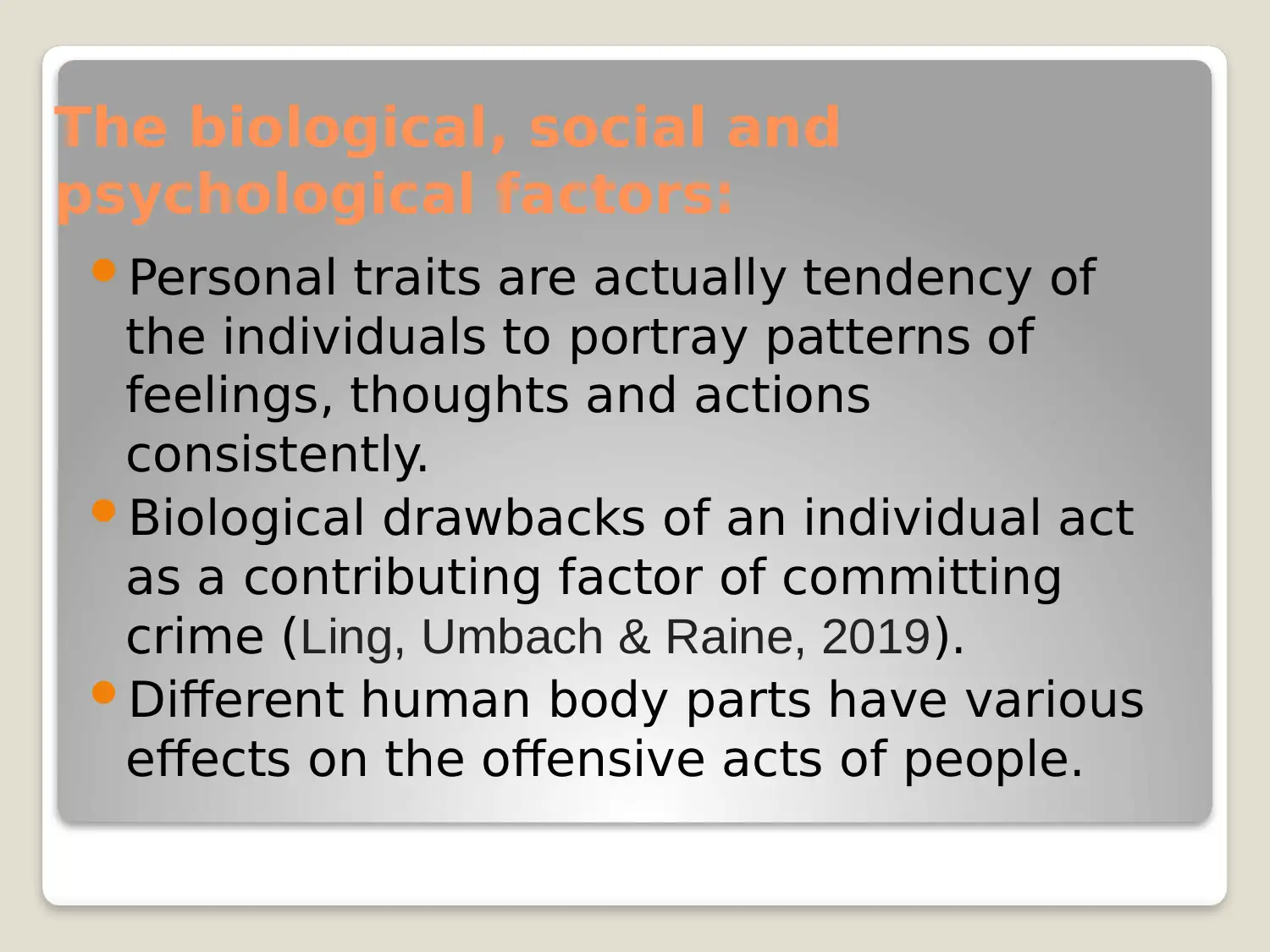
The biological, social and
psychological factors:
Personal traits are actually tendency of
the individuals to portray patterns of
feelings, thoughts and actions
consistently.
Biological drawbacks of an individual act
as a contributing factor of committing
crime (Ling, Umbach & Raine, 2019).
Different human body parts have various
effects on the offensive acts of people.
psychological factors:
Personal traits are actually tendency of
the individuals to portray patterns of
feelings, thoughts and actions
consistently.
Biological drawbacks of an individual act
as a contributing factor of committing
crime (Ling, Umbach & Raine, 2019).
Different human body parts have various
effects on the offensive acts of people.
Paraphrase This Document
Need a fresh take? Get an instant paraphrase of this document with our AI Paraphraser
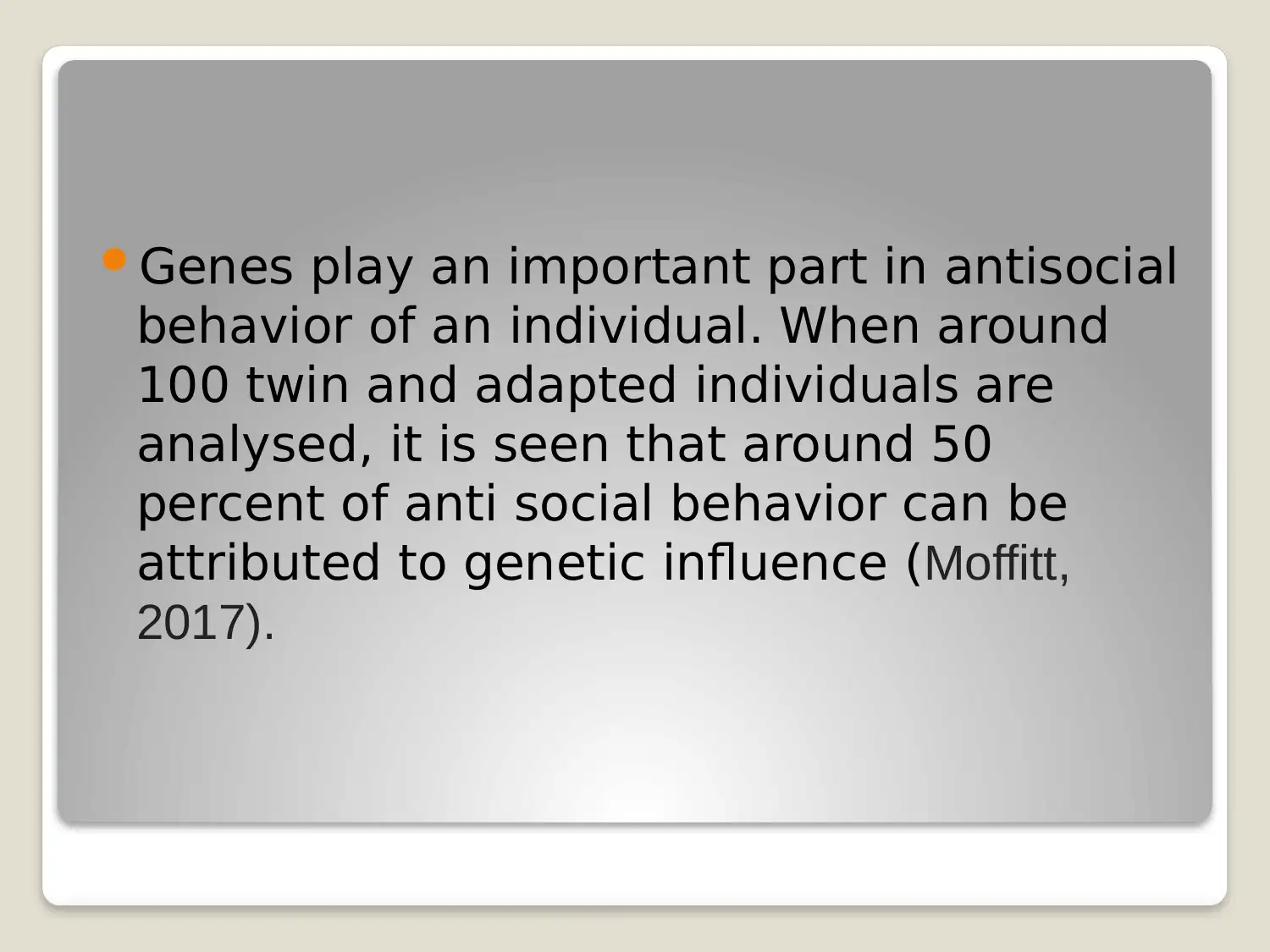
Genes play an important part in antisocial
behavior of an individual. When around
100 twin and adapted individuals are
analysed, it is seen that around 50
percent of anti social behavior can be
attributed to genetic influence (Moffitt,
2017).
behavior of an individual. When around
100 twin and adapted individuals are
analysed, it is seen that around 50
percent of anti social behavior can be
attributed to genetic influence (Moffitt,
2017).
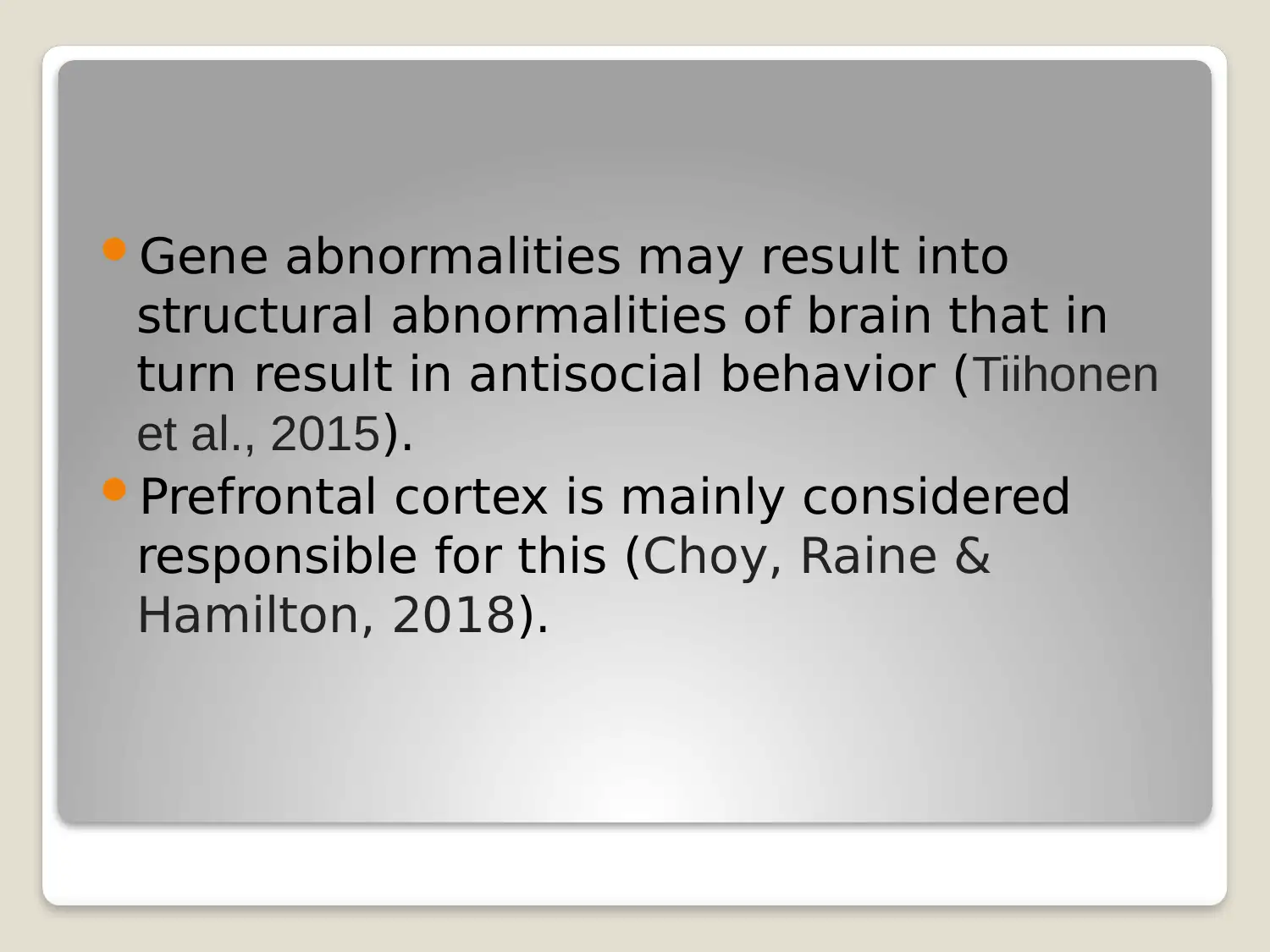
Gene abnormalities may result into
structural abnormalities of brain that in
turn result in antisocial behavior (Tiihonen
et al., 2015).
Prefrontal cortex is mainly considered
responsible for this (Choy, Raine &
Hamilton, 2018).
structural abnormalities of brain that in
turn result in antisocial behavior (Tiihonen
et al., 2015).
Prefrontal cortex is mainly considered
responsible for this (Choy, Raine &
Hamilton, 2018).
⊘ This is a preview!⊘
Do you want full access?
Subscribe today to unlock all pages.

Trusted by 1+ million students worldwide
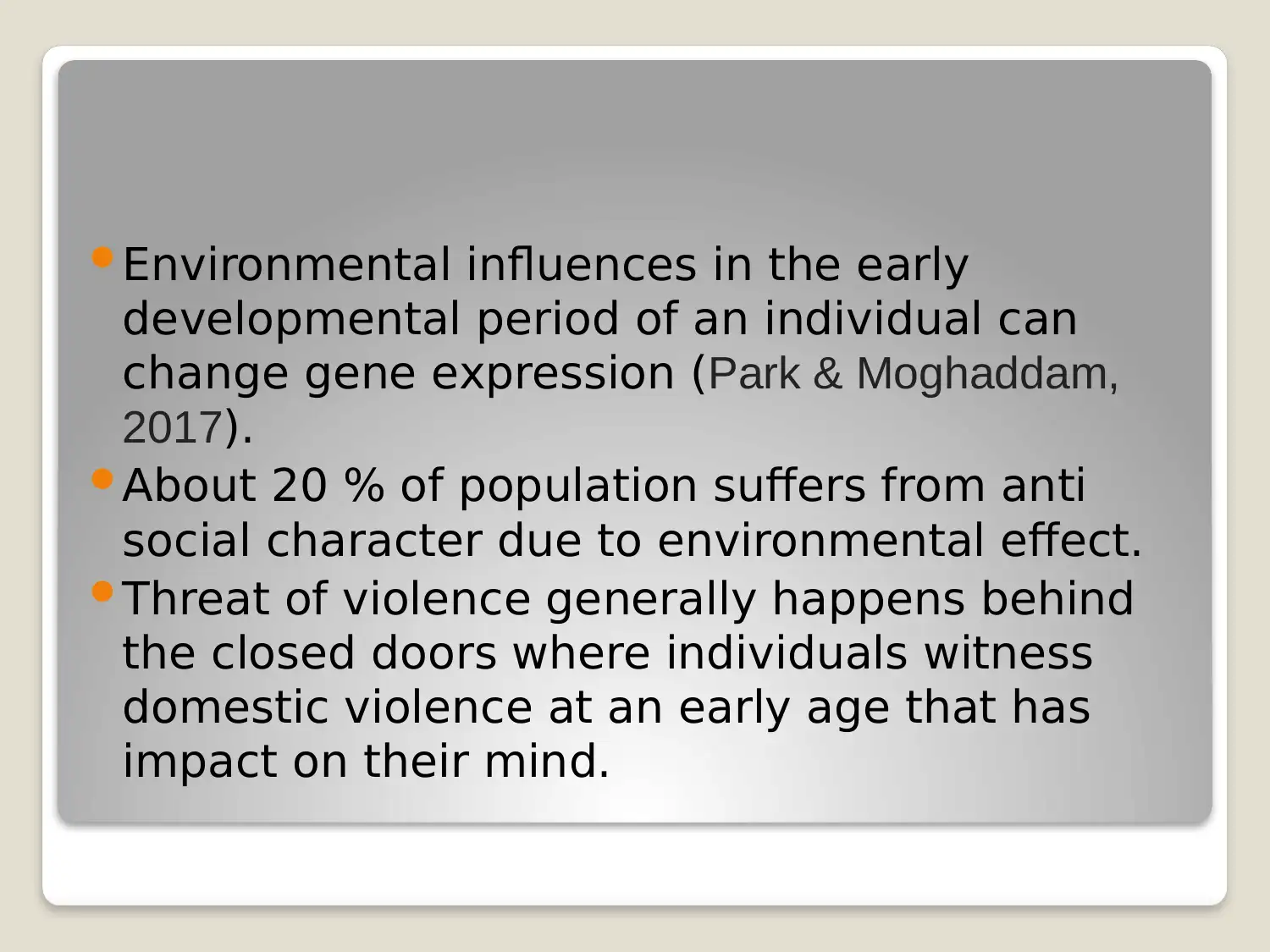
Environmental influences in the early
developmental period of an individual can
change gene expression (Park & Moghaddam,
2017).
About 20 % of population suffers from anti
social character due to environmental effect.
Threat of violence generally happens behind
the closed doors where individuals witness
domestic violence at an early age that has
impact on their mind.
developmental period of an individual can
change gene expression (Park & Moghaddam,
2017).
About 20 % of population suffers from anti
social character due to environmental effect.
Threat of violence generally happens behind
the closed doors where individuals witness
domestic violence at an early age that has
impact on their mind.
Paraphrase This Document
Need a fresh take? Get an instant paraphrase of this document with our AI Paraphraser
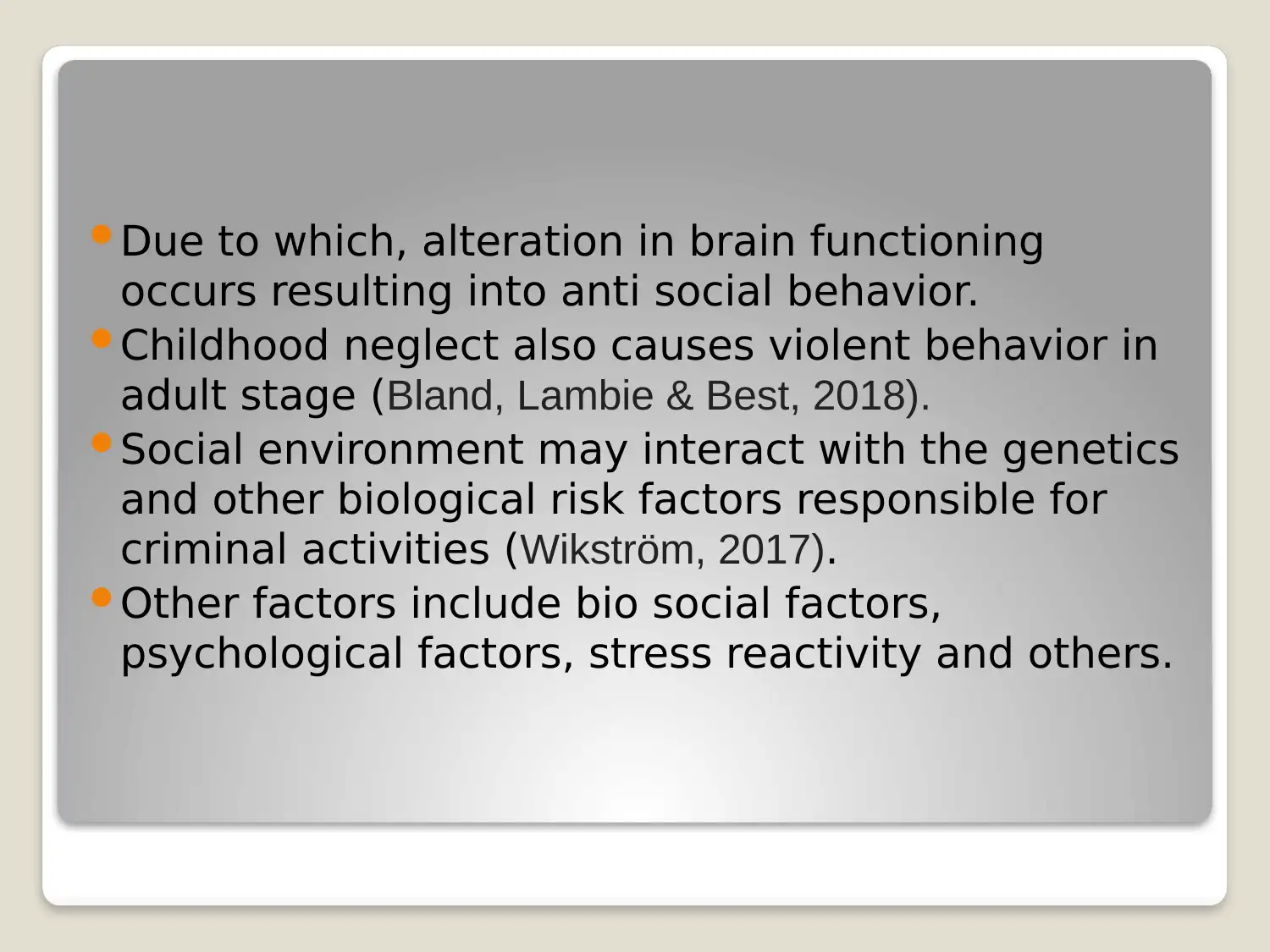
Due to which, alteration in brain functioning
occurs resulting into anti social behavior.
Childhood neglect also causes violent behavior in
adult stage (Bland, Lambie & Best, 2018).
Social environment may interact with the genetics
and other biological risk factors responsible for
criminal activities (Wikström, 2017).
Other factors include bio social factors,
psychological factors, stress reactivity and others.
occurs resulting into anti social behavior.
Childhood neglect also causes violent behavior in
adult stage (Bland, Lambie & Best, 2018).
Social environment may interact with the genetics
and other biological risk factors responsible for
criminal activities (Wikström, 2017).
Other factors include bio social factors,
psychological factors, stress reactivity and others.
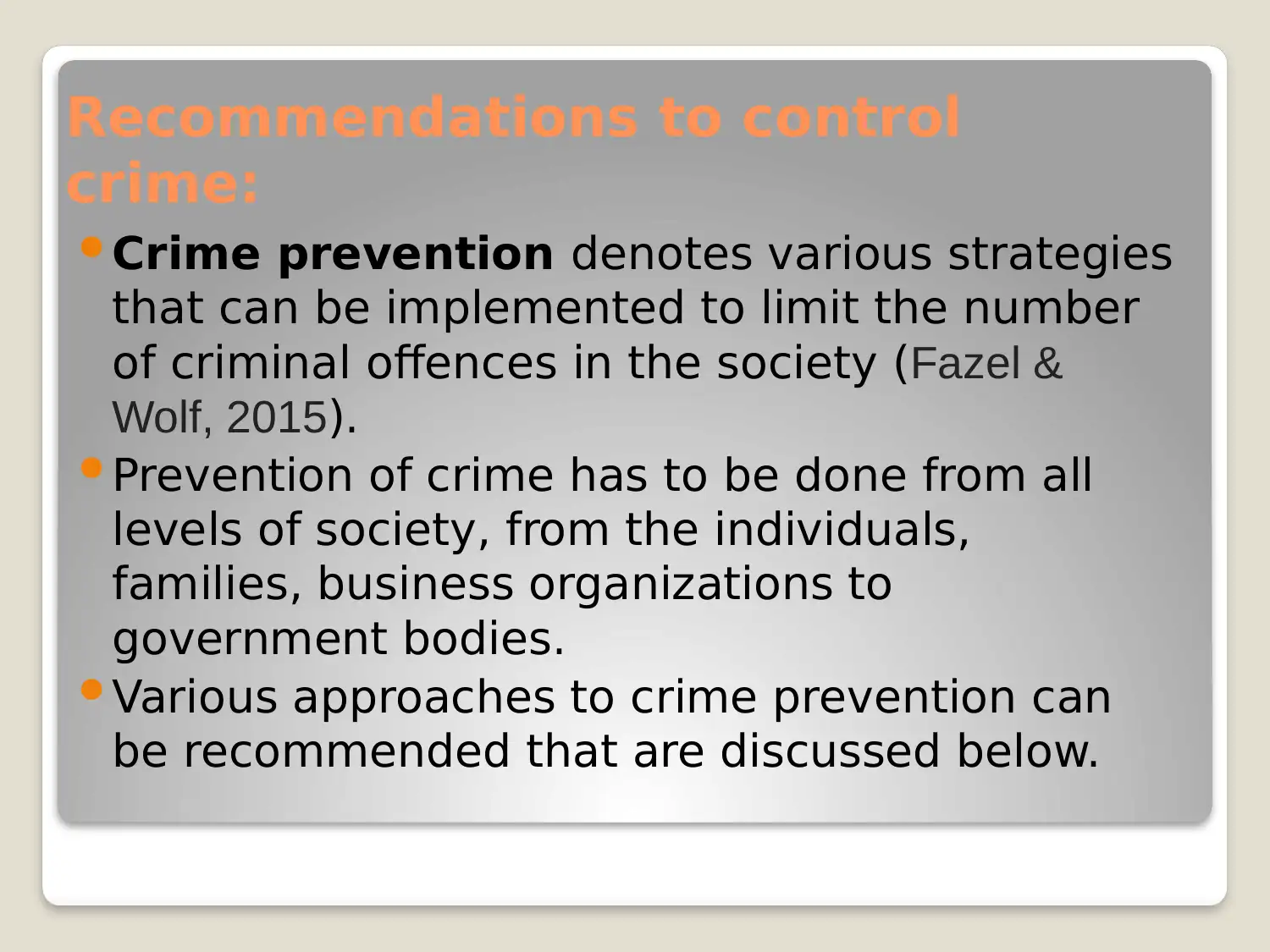
Recommendations to control
crime:
Crime prevention denotes various strategies
that can be implemented to limit the number
of criminal offences in the society (Fazel &
Wolf, 2015).
Prevention of crime has to be done from all
levels of society, from the individuals,
families, business organizations to
government bodies.
Various approaches to crime prevention can
be recommended that are discussed below.
crime:
Crime prevention denotes various strategies
that can be implemented to limit the number
of criminal offences in the society (Fazel &
Wolf, 2015).
Prevention of crime has to be done from all
levels of society, from the individuals,
families, business organizations to
government bodies.
Various approaches to crime prevention can
be recommended that are discussed below.
⊘ This is a preview!⊘
Do you want full access?
Subscribe today to unlock all pages.

Trusted by 1+ million students worldwide
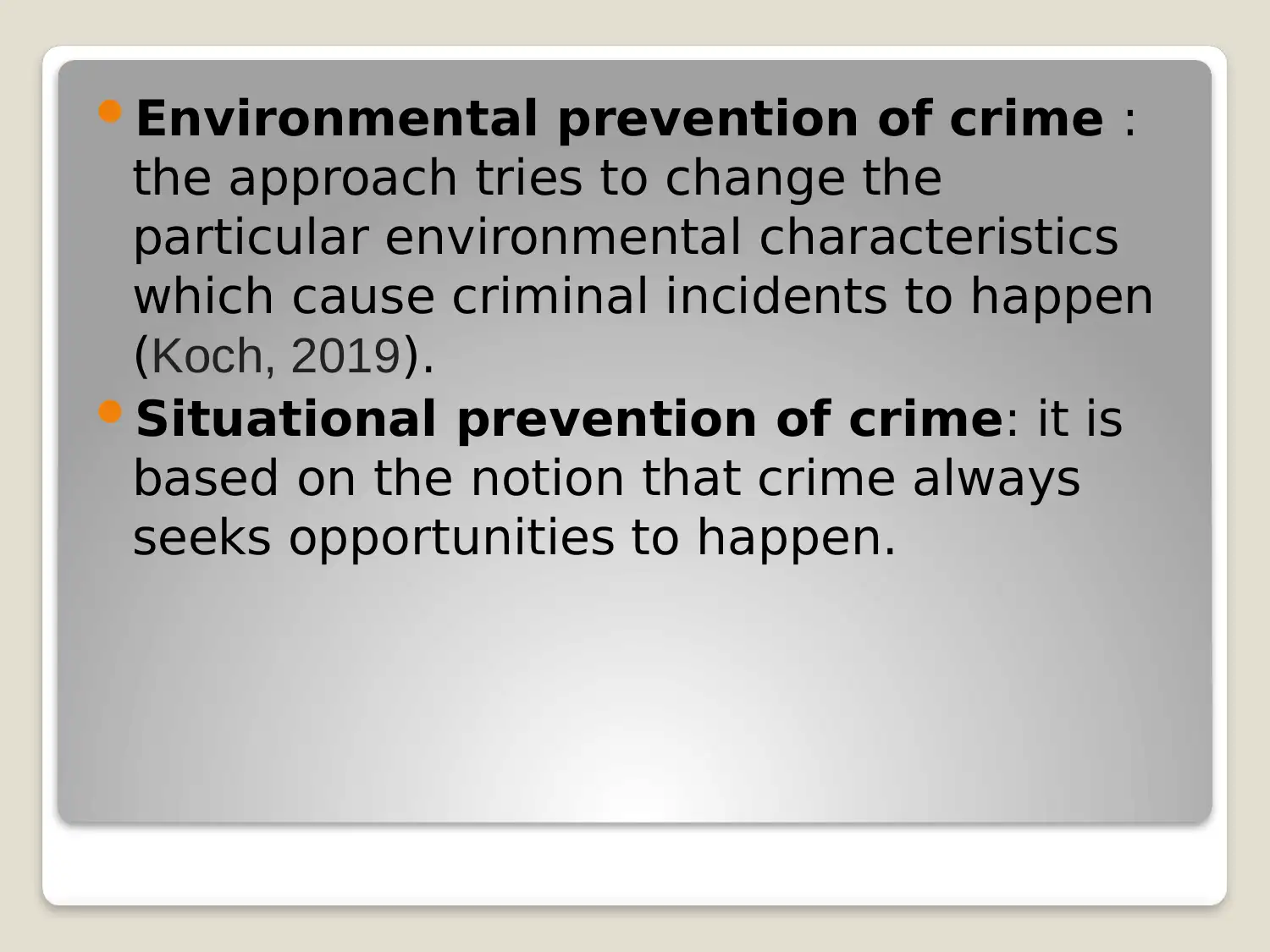
Environmental prevention of crime :
the approach tries to change the
particular environmental characteristics
which cause criminal incidents to happen
(Koch, 2019).
Situational prevention of crime: it is
based on the notion that crime always
seeks opportunities to happen.
the approach tries to change the
particular environmental characteristics
which cause criminal incidents to happen
(Koch, 2019).
Situational prevention of crime: it is
based on the notion that crime always
seeks opportunities to happen.
Paraphrase This Document
Need a fresh take? Get an instant paraphrase of this document with our AI Paraphraser
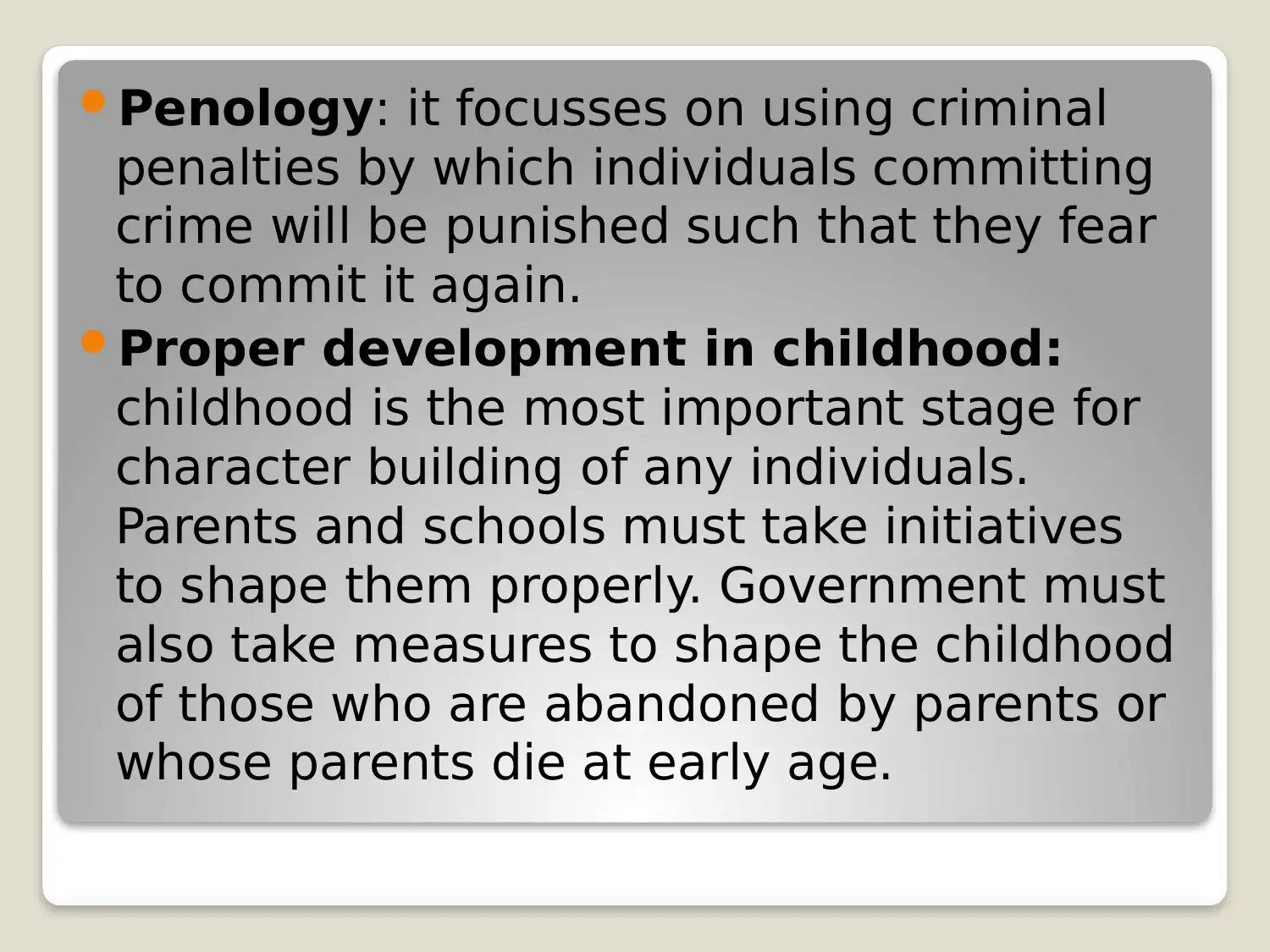
Penology: it focusses on using criminal
penalties by which individuals committing
crime will be punished such that they fear
to commit it again.
Proper development in childhood:
childhood is the most important stage for
character building of any individuals.
Parents and schools must take initiatives
to shape them properly. Government must
also take measures to shape the childhood
of those who are abandoned by parents or
whose parents die at early age.
penalties by which individuals committing
crime will be punished such that they fear
to commit it again.
Proper development in childhood:
childhood is the most important stage for
character building of any individuals.
Parents and schools must take initiatives
to shape them properly. Government must
also take measures to shape the childhood
of those who are abandoned by parents or
whose parents die at early age.
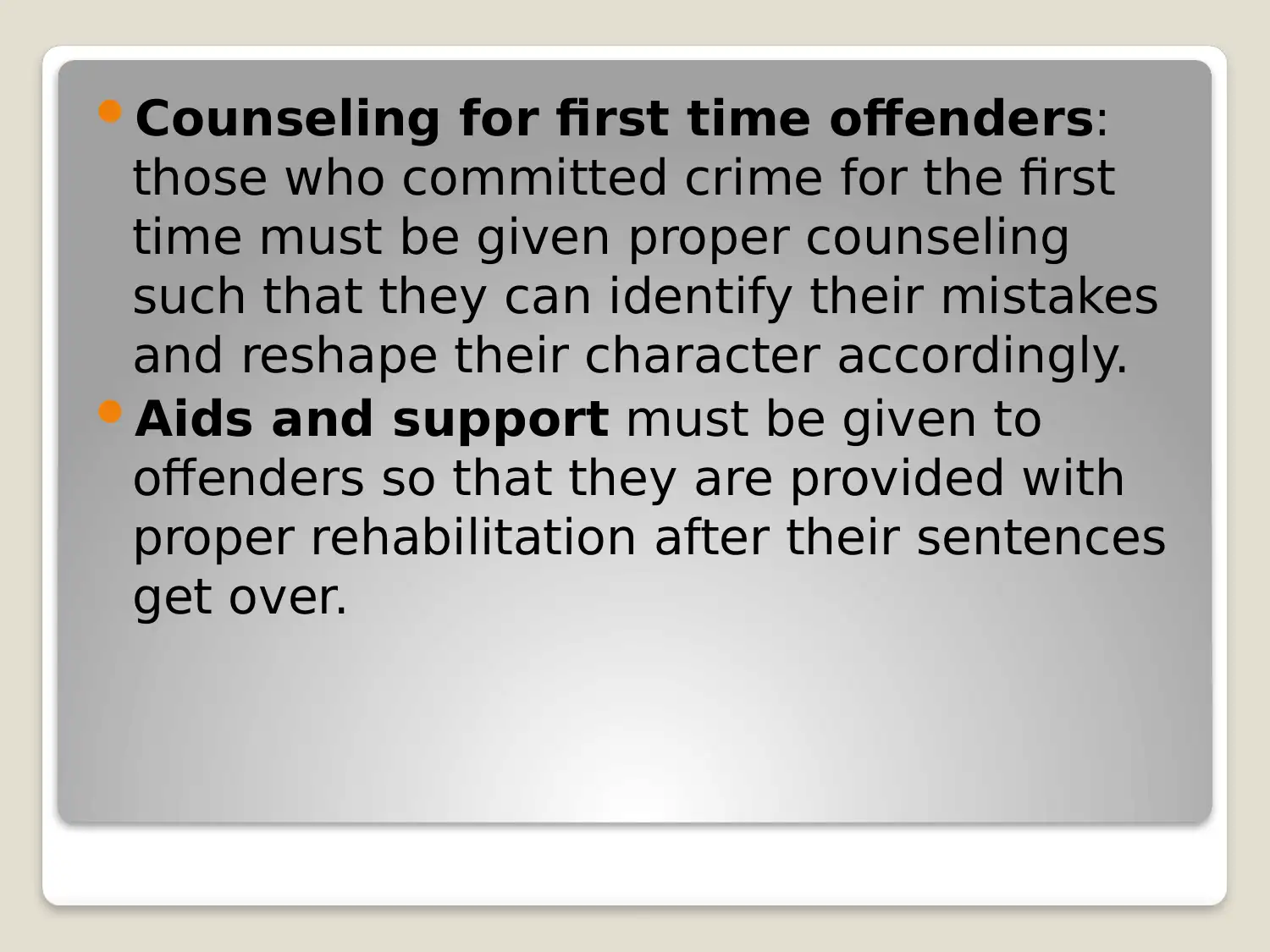
Counseling for first time offenders:
those who committed crime for the first
time must be given proper counseling
such that they can identify their mistakes
and reshape their character accordingly.
Aids and support must be given to
offenders so that they are provided with
proper rehabilitation after their sentences
get over.
those who committed crime for the first
time must be given proper counseling
such that they can identify their mistakes
and reshape their character accordingly.
Aids and support must be given to
offenders so that they are provided with
proper rehabilitation after their sentences
get over.
⊘ This is a preview!⊘
Do you want full access?
Subscribe today to unlock all pages.

Trusted by 1+ million students worldwide
1 out of 15
Related Documents
Your All-in-One AI-Powered Toolkit for Academic Success.
+13062052269
info@desklib.com
Available 24*7 on WhatsApp / Email
![[object Object]](/_next/static/media/star-bottom.7253800d.svg)
Unlock your academic potential
Copyright © 2020–2026 A2Z Services. All Rights Reserved. Developed and managed by ZUCOL.





